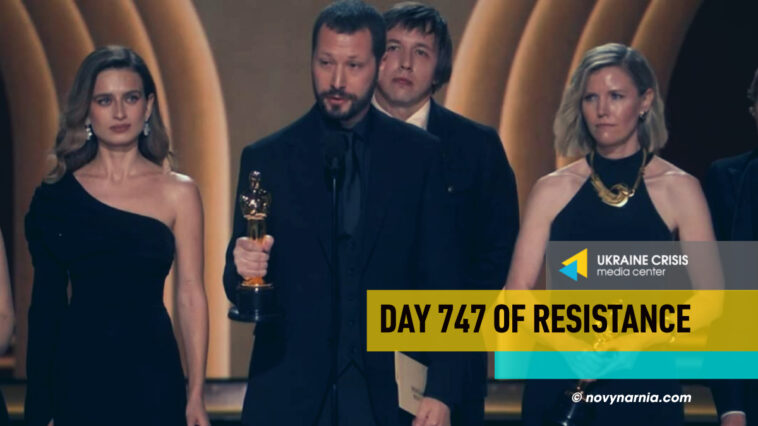“20 Days in Mariupol” wins the Oscar for best documentary. Ukraine builds three layers of fortifications that stretch 2,000 kilometers. Ukraine brings home five more children from Russia-occupied areas.
“20 Days in Mariupol” wins Oscar for best documentary
Mstyslav Chernov’s “20 Days in Mariupol” won the Oscar for Best Documentary Feature. This is Ukraine’s first-ever Oscar victory.
Chernov took to the stage with photographer Yevhen Maloletka and producer Vasylisa Stepanenko. The team worked together in besieged Mariupol in the early days of Russia’s invasion of Ukraine in 2022.
“This is the first Oscar in Ukrainian history, and I’m honored,” Chernov said. “Probably I will be the first director on this stage to say I wish I’d never made this film, I wish to be able to exchange this to Russia never attacking Ukraine, never occupying our cities,” Chernov continued. “I wish I could give up all the recognition for Russia not killing tens of thousands of my fellow Ukrainians. I wish for them to release all the hostages, all the soldiers who are protecting their lands, all the civilians who are now in their jails. But I cannot change the history. I cannot change the past, but we all together: you. I’m calling on you, some of the most talented people in the world. We can make sure that the history record is set straight and the truth will prevail, and that the people of Mariupol, and those who have given their lives, will never be forgotten. Because cinema forms memories and memories form history,” the film director said.
“20 Days in Mariupol” captures the first days of the Russian full-scale invasion and the destruction the city of Mariupol faced.
Video journalist Mstyslav Chernov, photographer Yevhen Maloletka and producer Vasylisa Stepanenko arrived an hour before Russia began bombing the port city. Two weeks later, they were the last journalists working for an international outlet in the city, sending crucial dispatches to the outside world. The team’s reporting out of Mariupol has also won the Pulitzer Prize for public service last year. Earlier this year, the film team won the national Shevchenko prize.
The film topped last year’s box office rankings among documentaries in Ukraine. It grossed UAH 500,000 (USD 13,000) in the domestic box office over its opening weekend.
Ukraine builds three layers of fortifications that stretch 2,000 km
On Monday, Ukrainian President Volodymyr Zelenskyi met with top government officials and military commanders to discuss the situation on the frontlines, weapon supplies, and construction of fortification lines.
“An important topic: fortifications. [I heard] a report from Prime Minister Denys Shmyhal on the time it takes to construct new defensive lines. Three lines of fortifications 2,000 kilometers long is an extensive task, but it is progressing at a good pace. I count on its timely completion,” Zelenskyi said.
The President also heard detailed reports from top military commanders — Commander-in-Chief of the Armed Forces of Ukraine, Colonel General Oleksandr Syrskyi, head of the General Staff, Major General Anatoliy Barhylevych, and field commanders of the situation on the frontlines, including in the Kupyansk, Lyman, Bakhmut, Avdiyivka, and Maryinka directions, and in the south. They also provided an account of the marines’ operations.
Ukraine brings home five more children from Russia-occupied areas
A rescue mission returned five Ukrainian children from Russia-occupied areas of Ukraine, head of the Kherson regional military administration, Oleksandr Prokudin said on Monday. The youngest child is two years old.
Five children and their family members, and an 18-year-old orphan returned to the government-controlled part of Ukraine. The children are between two and 18 years of age. The adults and children are in a safe place. They receive medical treatment and psychological support. Prokudin thanked the Save Ukraine humanitarian organization for the rescue mission.
Transnistria – will there be an escalation? Ukraine in Flames #583
In this episode of Ukraine in Flames, we discuss Transnistria – will there be an escalation? Transnistria a breakaway region under Russian control in Eastern Europe bordering Ukraine and Moldova, remains an unrecognized state since its illegal split from Moldova in 1992 during the collapse of the Soviet Union. Recent reports reveal Transnistria’s plea to Russia for protection against perceived Moldovan pressure, highlighting Moscow’s prioritization of its interests in the region. Russian influence and propaganda have long been significant, shaping public opinion and fostering anti-Moldovan sentiments. This influence, coupled with military and economic support from Russia, solidifies Moscow’s control over the region, aimed at destabilizing Moldova and exerting influence in Europe and Ukraine. Take a watch of UIF #583 to find out more.
Guests:
- Oleksiy Honcharenko, MP
- Archil Tsintsadze, security policy expert
- Yevhen Magda, Director of the Institute of World Policy




